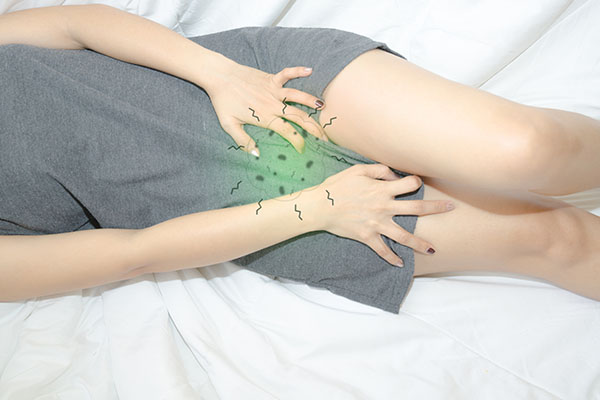In this article:
Vaginitis refers to an infection or inflammation of the vagina that results in itching, pain, odor, and discharge. (1) When it is accompanied by an inflamed vulva, it is known as vulvovaginitis.

mAbout one-third of females experience this gynecological ailment at least once in their lifetime, particularly during the reproductive years. Vaginitis can result from an infection, disturbance in the vaginal microbiota, and low estrogen levels in the body after menopause.
Types of Vaginitis
Vaginitis can be of the following types:
1. Yeast vaginitis
Yeast vaginitis is a yeast infection caused by an overgrowth of naturally occurring Candida (a kind of fungus) in the vagina.
2. Bacterial vaginosis
Bacterial vaginosis is an infection that stems from an imbalance in the vaginal microflora due to the excessive growth of one or more bacteria that begin to dominate other strains.
3. Atrophic vaginitis
Atrophic vaginitis is characterized by drying and thinning of the vaginal tissues due to decreased secretion of female hormones during breastfeeding or after menopause.
4. Trichomonas vaginitis
Trichomonas vaginitis is a sexually transmitted infection (STI) caused by the parasite Trichomonas, which can induce vaginal burning, soreness in the vulva and vagina, and a frothy, greenish-yellow discharge.
Causes of Vaginitis

Vaginitis typically results from a combination of multiple causative factors, including:
- Imbalance in the natural yeast or bacterial composition of the vagina
- An allergic reaction against deodorants, spermicides, etc.
- Foreign bodies such as retained tampons
- Low estrogen levels after menopause
- Normal physiologic variation
Fluctuations in the normal vaginal environment can occur due to:
- Sexual activity
- Menstrual cycle
- Pregnancy
- Wet clothing
- Tight pants
- Illness
- Change in the diet
- Use of certain medications
- Overuse of personal hygiene products, such as vaginal sprays, douches, and scented soaps
Symptoms of Vaginitis
Vaginitis may produce the following symptoms:
- Inflammation in the vagina
- Redness, itching, and irritation in the vaginal area
- Gray, white, yellow, or green vaginal discharge
- Pain or bleeding during sexual intercourse
- Change in the odor of vaginal discharge
- Burning and pain during urination
- Vaginal spotting or light bleeding
Vaginitis may manifest a few or all of these symptoms in some women, while others may not experience any symptoms at all.
Medical Treatment for Vaginitis

Vaginitis treatment will depend upon its underlying cause. Different medications will be prescribed for different types of infections:
Bacterial vaginosis
Bacterial vaginosis can be treated with oral or topical antibiotics. Moreover, the patient is advised to use protection or avoid having sexual intercourse during the course of treatment.
ALSO READ: Bacterial Vaginosis: Causes, Diagnosis, Treatment, and Prevention
Yeast infections
Yeast infections can be managed with antifungal creams or medicines that are inserted in the vagina.
You can use over-the-counter medications if you are certain that you have a yeast infection; otherwise, consult your doctor for a proper diagnosis before starting treatment.
Trichomoniasis
Trichomoniasis is commonly treated with oral metronidazole (Flagyl) or tinidazole. Even if only one person experiences the symptoms, both sexual partners should undergo treatment with metronidazole to prevent a relapse. (2)
This medication does not mix well with alcohol and can trigger adverse side effects. Thus, patients must follow a no-drinking policy up until 2 days after treatment.
Atrophic vaginitis
Atrophic vaginitis can be alleviated by applying estrogen-containing vaginal creams, patches, and rings or taking oral tablets that contain estrogen. However, oral estrogen may not be as effective as vaginal preparations.
Who Can Get Vaginitis?
Although vaginitis can occur at any age, it is more common among sexually active females of reproductive age. Given that vaginitis is rooted in multiple causes, it can affect sexually inactive women as well.
Diagnosing Vaginitis
Vaginitis can result from a variety of causes, each of which has to be addressed differently. Thus, the doctor will first diagnose the source of the problem and then prescribe the necessary treatment.
This usually involves the following procedures:
- Physical exam: The pelvic region is evaluated for the presence of any abnormality, redness, and tenderness around the vagina and vulva.
- pH test: The pH of the vagina is determined to check the presence of an infection. A pH higher than 5 is indicative of a vaginitis infection.
- Vaginal discharge evaluation: A sample of vaginal discharge may be taken and analyzed to detect an overgrowth of bacteria or yeast or the presence of STI-causing organisms such as Trichomonas.
- Vaginal culture: Vaginal fluid samples are taken for culture, which allows the detection of causative organisms. Vaginal culture is also known as a vaginal smear test or wet mount test.
- Biopsy: If the other tests suggest the absence of an infection, a biopsy of the affected area may be performed.
Risk Factors for Vaginitis
The following factors can increase the risk of developing vaginitis:
- Hormonal changes
- Wearing damp or tight-fitting clothes
- Poor hygiene
- Use of contraceptives
- Uncontrolled diabetes
- Smoking
- Pregnancy
- Use of intrauterine device (IUD)
- Physical or emotional stress
- Unprotected sexual intercourse with multiple partners
- Unhygienic utilization of sex toys
- Regular use of spermicides in large quantities
- Use of certain medications
- Frequent douching
Complications of Vaginitis

Although vaginitis is a mild disease, it can lead to certain complications if left untreated:
- Vaginitis increases the chances of catching STIs. Trichomoniasis is often associated with other STDs and therefore, patients should be tested accordingly.
- Vaginitis caused by bacterial vaginosis or trichomoniasis in pregnant females can lead to preterm labor and delivery.
- Yeast infections can lead to irritation, pain, difficulty in urinating, and increased sensitivity in the vaginal area.
- Bacterial vaginosis can be recurrent or chronic, requiring multiple treatments.
When to See a Doctor
It is advised to visit a medical practitioner as soon as you experience any vaginitis-related symptoms. Early treatment will lead to quicker recovery and lesser discomfort. Lack of treatment, on the other hand, can lead to more serious complications.
Note: Avoid having sex, douching, or using tampons before your appointment so that your health care provider can examine your vaginal discharge.
Final Word
Vaginitis can easily be treated with medications and self-care measures, such as maintaining vaginal hygiene, avoiding the use of scented products and douches, and practicing safe sex. This problem can be extremely discomforting but is unlikely to cause any serious harm.
However, childbearing women are advised to take extra precautions since they are more susceptible to vaginitis-induced complications that can jeopardize their pregnancy. If the symptoms persist despite the necessary care and treatment, consult your doctor.

- Was this article helpful?
- YES, THANKS!NOT REALLY


